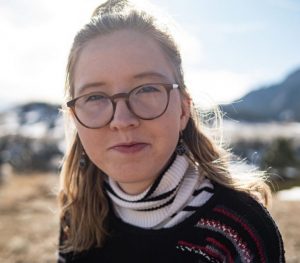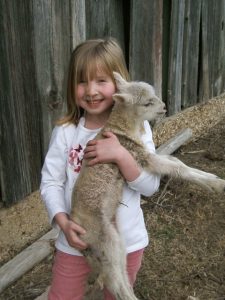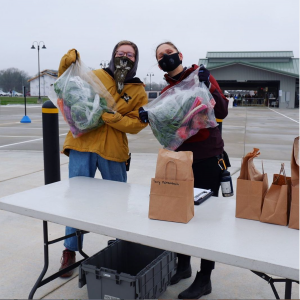May 20, 2021
Every Saturday morning, as the Mid-Missouri sun gleams off vendors’ tents and the aromas of breakfast burritos mingle with wildflowers, handmade soap and fresh produce, Veronica Fritz surveys the bustling scene and smiles. The 2021 Udall Scholar feels right at home among the artisans and agronomists at the Columbia Farmers Market where she has worked since 2019.

In fact, the only place where she might feel more comfortable is with her hands in the soil, a predilection that led to an undergraduate research opportunity with Noel Aloysius, MU assistant professor of bioengineering and natural resources.
“My parents have a farm in Columbia, and they would always send me outside where I would fish, play in the creek, help with the sheep or eat strawberries from the patch,” says Fritz, a senior biological engineering major whose mom and dad named her for the colorful veronica flower that attracts butterflies. “At Mizzou, I wanted to apply engineering and help solve problems associated with climate change.”
In spring 2020, the self-starting Fritz searched a list of researchers in the College of Agriculture, Food and Natural Resources for projects she might pursue during the pandemic. Now she helps Aloysius gather and analyze data from various local research plots. Using sensors that measure how much water the soil retains, the ultimate goal is to help gardeners and farmers maximize water efficiency thereby conserving resources.
“I rely on a team of dedicated people who can be independent, and that’s where Veronica has always impressed me,” says Aloysius, a hydroclimatologist whose research focuses on modeling water systems. “With minimum instruction, she is capable of doing things on her own and coming back and saying, ‘Here are some points I’m not sure about. Can you provide guidance?’ ”

Aloysius encouraged Fritz contact the MU Fellowships and Advanced Studies Office and apply for the Udall Scholarship, one of the programs of the Udall Foundation, a congressionally funded agency that honors the legacy of brothers Morris and Stewart Udall, the late U.S. congressmen known for their roles in conservation and environmental protection. The scholarship supports college sophomores and juniors committed to leadership and public service around issues related to Native American nations or to the environment. Fritz received $7,000 toward her continued education.
“Veronica is the real deal when it comes to being a current and future advocate,” says Rachel Newman, interim director of the Fellowships and Advanced Studies Office. The office helped Fritz refine her application materials and make her language and descriptions more concise. “She’s truly committed to helping make the world an inhabitable and sustainable place for all.”
Like any effective environmental advocate, Fritz’s global concerns are focused locally. In addition to the farmers market, she has volunteered for Peaceworks’ “Vote for the Climate” campaign and PedNet. She also serves as treasurer for Alpha Epsilon (the biological engineering honors society) and tutors calculus through the MU Learning Center.
“Recently, when the local peach farmers had a major crop failure and didn’t have enough peaches to bring to market, it really made me think directly about how climate affects agriculture,” Fritz says. “The average vegetable travels 1,500 miles, so the food (at the Columbia Farmers Market) has a smaller carbon footprint.”

Buying locally grown food might be a small step, but it’s a concrete one that many people can take. “We all live in this world, so we should all be responsible for taking care of it,” she says.
Corrina Smith, executive director of the Columbia Farmers Market, echoed that word when describing Fritz as an employee.
“She’s super responsible. For example, in fall 2020, I broke my leg and I was out of commission for two months — right when we launched an online store with curbside pickup,” Smith says. “Without training and without me there to supervise, I put it in her hands and she executed it like a rock star.”
Regardless of Fritz’s path, she hopes to continue climate-related research and help people understand the impact of today’s decisions on the planet’s future.
“We lack informed arguments, and the information can be mixed up in the political bias of it all,” Fritz says. “I hope my research goes into informing politics and identifying the pros and cons. We should always consider the impacts of the actions we take instead of accepting a seemingly one-size fits all resolution.”